If you're looking for the best professional car diagnostic tools of 2024, consider the Ancel AD310 for straightforward error troubleshooting, or the FIXD Bluetooth OBD2 Scanner, which translates codes into plain English. The OBD2 Scanner Diagnostic Tool offers a vast code library, while the FOXWELL Car Scanner NT604 Elite covers multiple systems effortlessly. Don't overlook the BlueDriver Bluetooth Pro, known for its detailed repair reports and live data monitoring. Each tool varies in compatibility and features, ensuring you'll find the right fit for your needs. Keep exploring to uncover which tool fits you best!
Ancel AD310 OBD II Scanner Car Engine Fault Code Reader
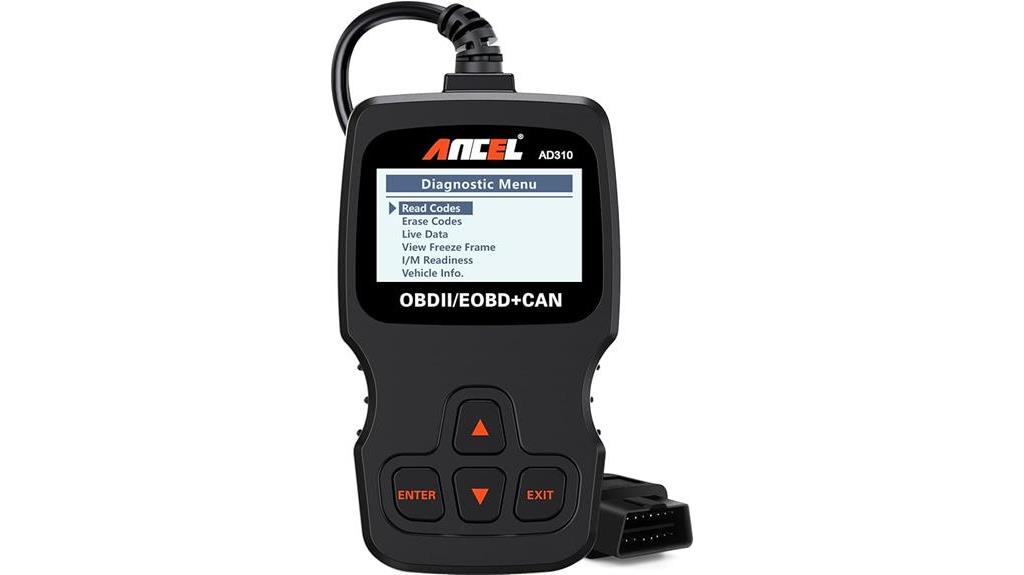
If you're a car owner or mechanic looking for a reliable and user-friendly diagnostic tool, the Ancel AD310 OBD II Scanner stands out with its ability to read and clear error codes for vehicles from 1996 and newer. This scanner supports all major OBDII protocols, making it compatible with a wide range of cars, light trucks, and SUVs. I love its large, clear display and the clearly labeled buttons that simplify navigation. Plus, it doesn't need batteries—just plug it into the OBDII Data Link Connector, and you're good to go. In seconds, it reads and clears codes, providing accurate results every time. With a 4.6-star rating from nearly 50,000 users, it's a must-have for effective vehicle troubleshooting.
Best For: The Ancel AD310 OBD II Scanner is best for car owners and mechanics seeking a reliable and user-friendly diagnostic tool for vehicles from 1996 and newer.
Pros:
- Easy to use with a large, clear display and clearly labeled buttons for navigation.
- No batteries required; powered directly from the OBDII Data Link Connector.
- Fast and accurate results, capable of reading and clearing codes in seconds.
Cons:
- Limited to OBDII vehicles; won't work with older models or those not compliant with OBDII.
- Basic functionality may not meet the needs of advanced users requiring in-depth diagnostics.
- The 2.5-foot cable may limit accessibility in some vehicle setups.
FIXD Bluetooth OBD2 Scanner for Car
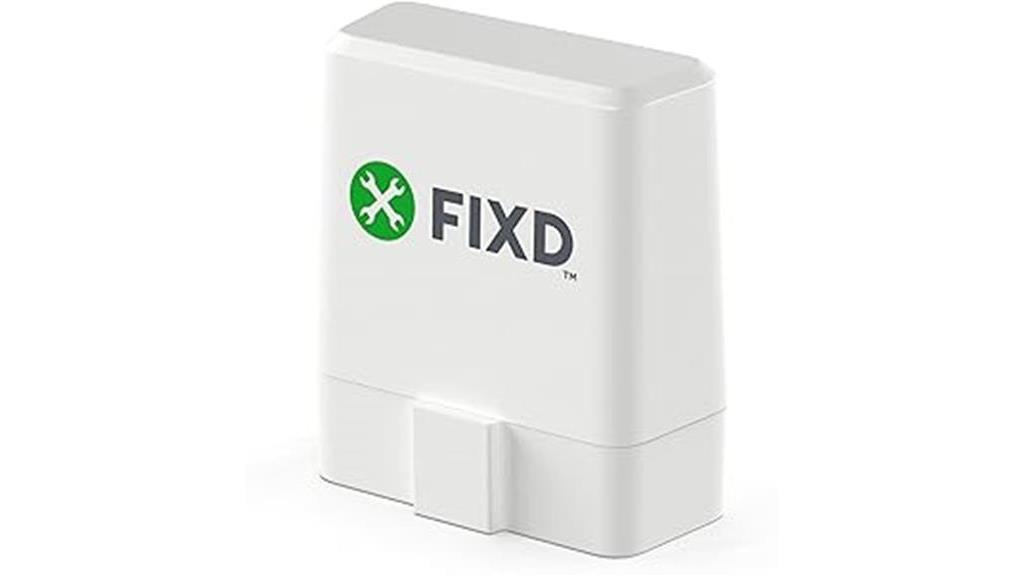
The FIXD Bluetooth OBD2 Scanner is an excellent choice for DIY car enthusiasts and everyday drivers looking to save time and money on vehicle maintenance. This scanner is compatible with all gas vehicles made in 1996 or newer and diesel vehicles from 2008 onward, working seamlessly with both iPhone and Android devices. It translates over 7,000 engine fault codes into plain English, making diagnostics straightforward. The wireless Bluetooth connection sets up in minutes, and I love that it provides live data monitoring, like vehicle speed and O2 sensor voltage. Plus, it tracks maintenance needs and sends alerts, which helps avoid costly repairs. For anyone wanting to tackle DIY fixes, FIXD offers helpful guides and even clears the check engine light.
Best For: DIY car enthusiasts and everyday drivers seeking an easy-to-use diagnostic tool to save time and money on vehicle maintenance.
Pros:
- Translates over 7,000 engine fault codes into plain English for easy understanding.
- Wireless Bluetooth connection allows for quick setup and live data monitoring.
- Provides maintenance tracking and alerts to help avoid costly repairs.
Cons:
- Additional fees may apply for premium features and services.
- Some users report issues with the reliability of the Bluetooth connection.
- Limited functionality for vehicles made before 1996 and diesel vehicles older than 2008.
OBD2 Scanner Diagnostic Tool for All OBDII Cars
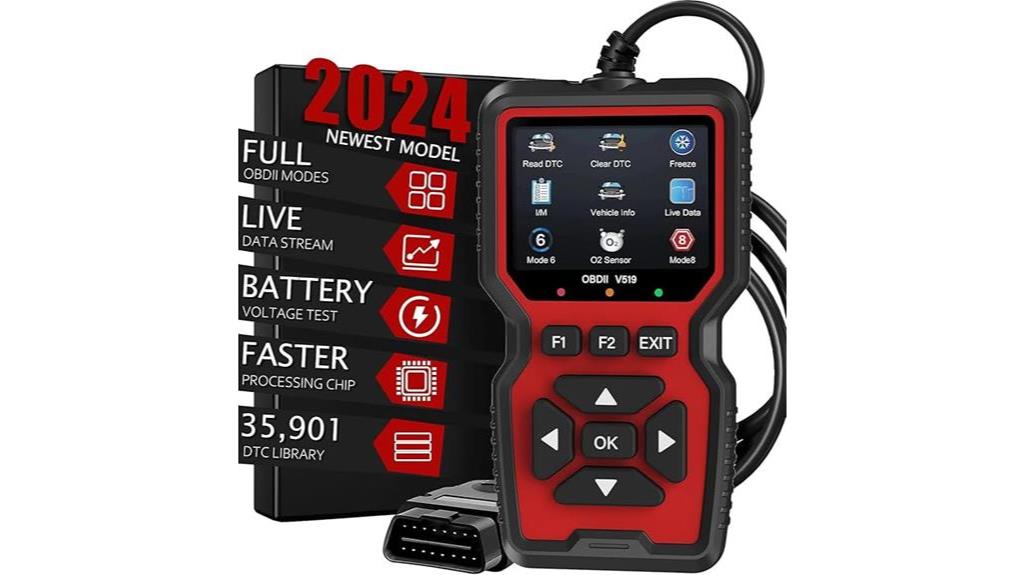
For anyone looking to tackle car troubles head-on, the OBD2 Scanner Diagnostic Tool stands out as an essential device. This tool is compatible with 98% of vehicles made after 1996, making it a versatile choice for any OBDII car. It features a built-in DTC library with over 35,901 codes, far surpassing typical scanners. I appreciate its diagnostic functions, which allow me to read and clear codes, turn off the engine light, and even test components. The 2.8-inch TFT true color LCD display provides clear results, and its compact design makes it easy to transport. Plus, it connects to my computer for data printing, helping me save on unexpected repair costs. Overall, it's a reliable tool that I highly recommend.
Best For: Car owners who want a reliable, user-friendly diagnostic tool for troubleshooting engine issues across a wide range of vehicles.
Pros:
- Comprehensive DTC library with over 35,901 codes for accurate diagnostics.
- Easy-to-read 2.8-inch TFT true color LCD display.
- Compact and portable design powered directly through the vehicle's OBD2 interface.
Cons:
- Some users report issues with language translation.
- Compatibility may vary with specific vehicle brands.
- Limited advanced features compared to higher-end models.
FOXWELL Car Scanner NT604 Elite OBD2 Scanner
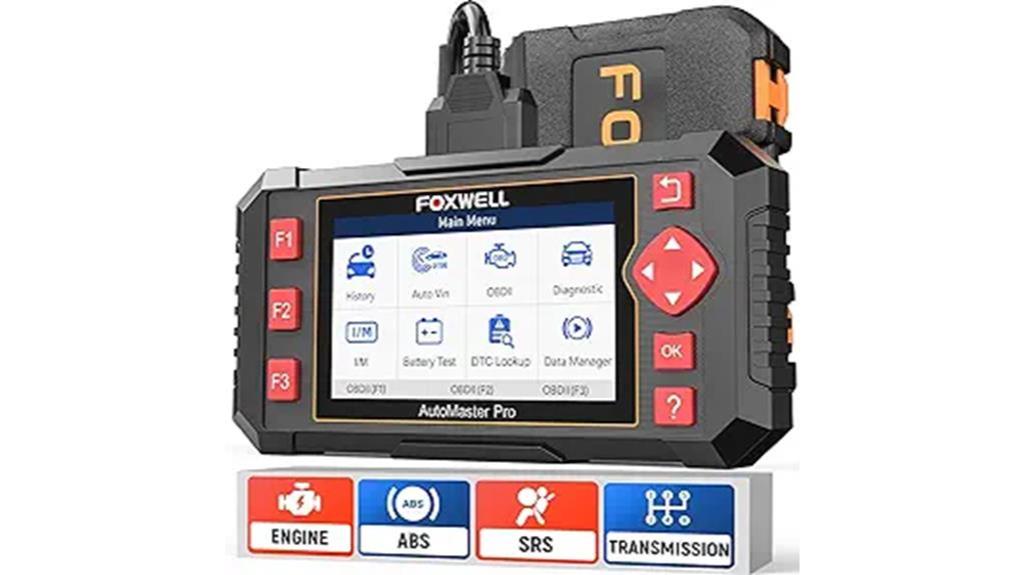
Designed with both car owners and professionals in mind, the FOXWELL Car Scanner NT604 Elite OBD2 Scanner stands out as a top choice for anyone looking to diagnose vehicle issues effectively. This 5-in-1 diagnostic tool covers critical systems like ABS, SRS, engine, and transmission, making it incredibly versatile. I love how easy it is to use right out of the box, with no software downloads needed. The AUTOVIN feature quickly retrieves VIN and vehicle information, supporting over 60 car makes worldwide. Plus, the solid protective case adds durability. With lifetime updates included, I never worry about extra costs. Rated 4.3 out of 5 stars by users, it's proven to deliver effective diagnostics and clear codes effortlessly.
Best For: Car owners and professionals seeking an easy-to-use, versatile diagnostic tool for vehicle issues.
Pros:
- 5-in-1 functionality covers multiple critical systems, enhancing diagnostic capabilities.
- User-friendly design with no software downloads needed, making it accessible for everyone.
- Lifetime updates ensure the scanner remains up-to-date without additional costs.
Cons:
- Some users may find the weight (2.79 pounds) a bit cumbersome for portable use.
- Limited advanced features compared to higher-end professional diagnostic tools.
- Warranty details require a request for specific information, which may not be convenient for all users.
BlueDriver Bluetooth Pro OBD2 Car Scan Tool for iPhone & Android
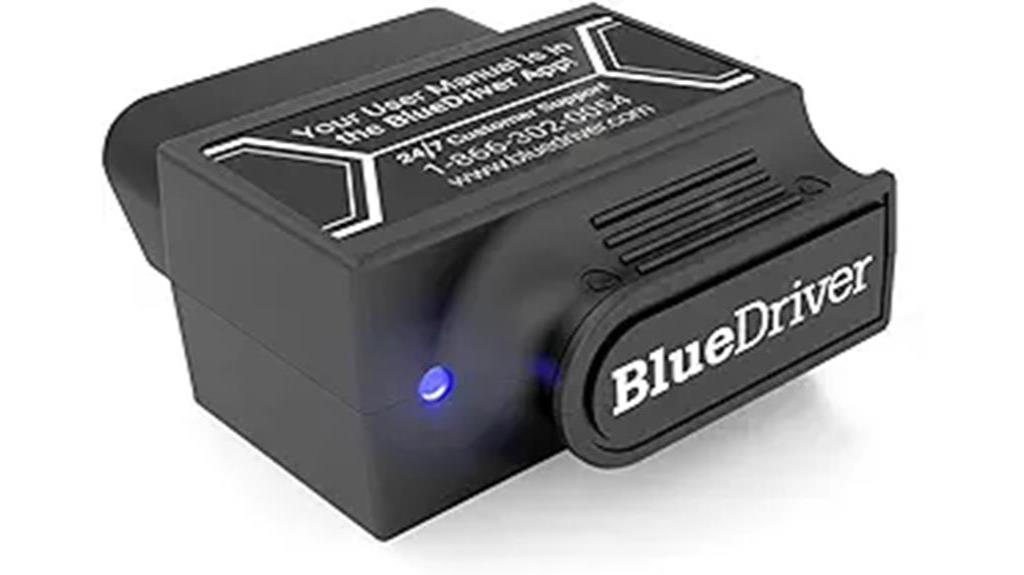
Looking for a reliable tool to diagnose your car's issues without breaking the bank? The BlueDriver Bluetooth Pro OBD2 Car Scan Tool is a fantastic option. It easily reads and clears trouble codes, including ABS and airbag issues, all through your smartphone. I love that it provides unlimited specific repair reports, helping me understand possible causes and fixes for my vehicle. The wireless Bluetooth connection and user-friendly app make it simple to use, and there are no hidden subscription fees. Plus, with live data monitoring, I can track my vehicle's health in real-time. While some features, like VIN scanning, might be hit or miss, the overall accuracy and convenience make BlueDriver a great choice for DIY diagnostics.
Best For: DIY car enthusiasts and individuals seeking an affordable solution for vehicle diagnostics without the need for professional assistance.
Pros:
- Wireless operation allows for easy connectivity with smartphones and tablets.
- Provides unlimited specific repair reports, enhancing user understanding of vehicle issues.
- Live data monitoring enables real-time tracking of vehicle health while driving.
Cons:
- Limited instructional materials; users must rely on the app for guidance.
- VIN scanning feature may not work consistently for all vehicles.
- Lacks a protective carrying case, which some users find necessary for storage.
Factors to Consider When Choosing Professional Car Diagnostic Tools
When choosing professional car diagnostic tools, you need to take into account several key factors. Think about compatibility with the vehicle types you'll be working on, the diagnostic functions the tool offers, and how user-friendly the interface is. Don't forget to evaluate portability, storage options, and the update and support policy, as these can greatly affect your experience.
Compatibility With Vehicle Types
Choosing the right professional car diagnostic tool hinges on its compatibility with the specific vehicle types you work with. First, look for a tool that supports OBDII protocols, especially if you're dealing with vehicles from 1996 and newer. Common protocols include KWP2000, J1850 VPW, ISO9141, J1850 PWM, and CAN.
Next, confirm the diagnostic tool covers the makes and models you typically service. Many tools claim to support 98% or more of vehicles manufactured after 1996, so it's worth verifying this before making a purchase. If you work with diesel vehicles, check that the tool is compatible with models from 2008 and newer, as not all tools cater to older diesel engines.
If your fleet includes both gas and diesel vehicles, consider a tool that can handle both types for added versatility. Finally, verify that the tool can read critical systems in your vehicles, such as ABS, SRS, and transmission diagnostics. This confirms you can address a thorough range of potential issues, making your diagnostic efforts more effective and efficient.
Diagnostic Functions Offered
After verifying compatibility with various vehicle types, the next step in selecting a professional car diagnostic tool is to evaluate the diagnostic functions it offers. Look for tools that can read and clear fault codes, stream live data, and provide freeze frame data. These features are essential for a thorough vehicle analysis and quick troubleshooting.
A robust tool should include a built-in diagnostic trouble code (DTC) library with over 30,000 codes, allowing you to interpret faults effectively. Additionally, verify the tool performs I/M readiness checks, which verify if a vehicle is ready for emissions testing—crucial for compliance with local regulations.
Consider advanced diagnostic functions like Mode 6 and Mode 8, which allow for in-depth testing of vehicle performance and onboard monitoring systems. These features can provide valuable insights into your vehicle's health.
Lastly, having the capability to conduct specific tests, such as O2 sensor checks and battery voltage assessments, will further enhance your diagnostic accuracy. By focusing on these diagnostic functions, you'll be better equipped to make informed decisions about vehicle maintenance and repairs.
User Interface Design
Evaluating user interface design is vital for selecting a professional car diagnostic tool that meets your needs. A large and clear display enhances readability, allowing you to easily view diagnostic results and codes without straining your eyes. When maneuvering through menus and functions, clearly labeled buttons can make a significant difference, minimizing the learning curve for new users.
An intuitive user interface can greatly improve your experience, making it easier to operate the diagnostic tool even without prior technical knowledge. Look for tools that offer thorough instructions and easy-to-understand code translations, as these features can help you quickly diagnose issues and take appropriate action.
Additionally, consider how the design prioritizes usability. A well-designed interface not only makes navigation simple but also guarantees that you get the most out of your diagnostic tool. While portability is important, remember that a user-friendly interface is essential for effective diagnostics. By focusing on these aspects, you'll be better equipped to choose a tool that not only meets your technical needs but also enhances your overall experience as a user.
Portability and Storage
When it comes to professional car diagnostic tools, portability and storage play a crucial role in your overall experience. You'll want to evaluate the weight and dimensions of the tool; compact designs make it easier for you to store and transport, especially when you're on the go. A diagnostic tool that's lightweight and small can be a game-changer for your mobile diagnostics.
Evaluate the power source, too. Tools that plug directly into the vehicle's OBD2 interface eliminate the hassle of extra batteries or chargers, enhancing portability. Look for devices that come with protective cases or have durable designs for safe storage and transport, particularly if you're using them frequently in various environments.
Wireless capabilities are another feature to evaluate. Bluetooth or Wi-Fi connections allow you to move around freely without being tethered to the vehicle, making diagnostics much more convenient. Finally, assess the ease of setup and user interface. A straightforward design not only improves your experience but also simplifies the process of accessing and storing your tool, ensuring you're always ready for the next job.
Update and Support Policy
Choosing the right professional car diagnostic tool involves more than just features and price; the update and support policy is essential for guaranteeing long-term usability. You'll want to prioritize tools that offer lifetime software updates. This guarantees your diagnostic tool stays compatible with the latest vehicle models and technologies.
A solid support policy is equally important. Look for tools that provide prompt customer service options, such as phone or chat support, to help you troubleshoot any technical issues you may encounter. It's also wise to check if the diagnostic tool includes free or affordable updates for new vehicle protocols and features. Ongoing maintenance is vital for your tool's effectiveness.
Additionally, a clear warranty and return policy can save you from potential headaches. This allows for returns or exchanges if the tool doesn't meet your expectations. Finally, an active user community or forum can greatly enhance your experience. Engaging with others who share their experiences and solutions can provide invaluable support as you navigate your diagnostic tool. By considering these factors, you'll guarantee your investment remains beneficial over time.
Price and Value Comparison
The cost of a professional car diagnostic tool can greatly impact your decision-making process. When selecting a tool, you'll want to weigh the initial purchase price against the potential long-term savings it offers. Basic OBD2 scanners often come with lower price tags but may lack the advanced features you need for in-depth diagnostics. Conversely, more extensive tools might require a higher upfront investment, yet they can save you money on repairs over time.
Look for tools that provide lifetime updates and no extra subscription fees, as these can enhance your overall value. You'll want to verify you're equipped with the latest diagnostic capabilities without incurring ongoing costs. Additionally, pay attention to customer feedback and ratings; they can give you insight into how effective a tool is relative to its price.
Don't forget to compare the number of supported vehicle makes and models, along with the range of diagnostic functions available. This comparison will help you determine if a tool truly offers good value for your investment. By considering these factors, you can make a more informed decision tailored to your specific needs.
Frequently Asked Questions
Are These Diagnostic Tools Suitable for All Vehicle Makes and Models?
Not all diagnostic tools are suitable for every vehicle make and model. You'll want to check compatibility before purchasing. Some tools are designed for specific brands, while others cover a broader range. If you're working on a variety of vehicles, look for tools that support multiple makes. Always read the specifications and user reviews to confirm the tool meets your needs, so you can efficiently diagnose issues across different cars.
How Often Should Diagnostic Tools Be Updated for Optimal Performance?
To keep your diagnostic tools running smoothly, you should update them regularly. It's generally recommended to check for updates every few months, but if you're working with new vehicle models or technologies, doing it more often is wise. Updates often include enhancements and new features that can greatly improve the tool's accuracy and efficiency. Staying current helps you diagnose issues effectively and guarantees you're equipped to handle the latest automotive advancements.
Can These Tools Diagnose Hybrid or Electric Vehicles?
Yes, many modern diagnostic tools can diagnose hybrid and electric vehicles. You'll find that these tools are designed to communicate with the unique systems found in these cars, such as battery management and electric drive systems. However, it's crucial to verify that the diagnostic tool you choose supports hybrid and electric vehicle protocols. Always check for compatibility before purchasing, so you can accurately troubleshoot any issues your vehicle may have.
What Is the Average Lifespan of These Diagnostic Tools?
The average lifespan of car diagnostic tools typically ranges from 5 to 10 years, depending on usage and maintenance. If you take care of your tool, you might even extend its life. Frequent software updates and proper handling play significant roles in longevity. You should also consider the technology's evolution; older models might not keep up with newer vehicles, impacting their utility over time. Regularly assess your tool's performance to guarantee it meets your needs.
Are There Any Additional Accessories Needed for These Tools to Function?
When you're using car diagnostic tools, you might need a few additional accessories for peak performance. Often, a reliable OBD-II cable is essential, as it connects the tool to your vehicle's onboard computer. You may also want a charging cable for portable devices and a protective case to keep everything organized. Depending on your specific tool, software updates or adapters for different vehicle models could be necessary too. Always check your tool's requirements!
Wrapping Up
In summary, choosing the right professional car diagnostic tool can feel like finding a needle in a haystack, but it doesn't have to be that intimidating! With options like the Ancel AD310 and BlueDriver, you can easily tackle any car issue that comes your way. Remember to take into account factors like compatibility and features to guarantee you're getting the best bang for your buck. Equip yourself with the right tool, and you'll be diagnosing like a pro in no time!
Ben Wilkinson is a an experienced mechanic with over 10 years of experience in the automotive repair industry. He is highly skilled in diagnosing and repairing a wide range of car-related issues, from basic maintenance tasks to more complex repairs.

